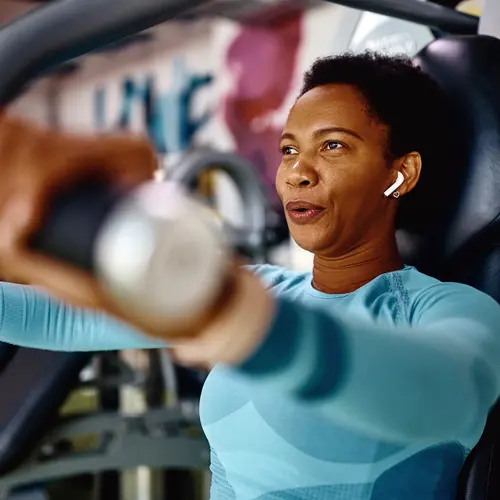Overactive Bladder Explained

Hide Video Transcript
Video Transcript
Have you ever had the sudden urge to go to the bathroom and your bladder just will not wait? I'm Joy Behar. And talking with an expert about what you can do about that, what is going on in your body. Dr. Schiff, let me ask you something. What exactly does it mean, OAB? What is that?
And the most basic way to think about it is you just need to go to the bathroom more frequently and more urgently than you'd like to. And in reality, this problem affects millions of people. Somewhere between 15 and 20 million people are affected by overactive bladder and/or incontinence. And it's probably even more than that because there are still a lot of people who won't mention it to their doctor. By the way, I have this issue.
Imagine what it's doing in India and China. Billions of people are leaking.
So are those the people who are most affected by it?
It tends to increase in frequency and prevalence as women get a little bit older. But men are also affected by it too.
where their prostate start to enlarge. But I have a lot of young men that I take care with this problem as well.
And they can go on long trips. They never have to stop. And the women are constantly-- there's a McDonald's. There's a Chuck E Cheese, you know? And also in the middle of the night. That's when it really happens to me.
men and women in the middle of the night for a couple of reasons-- one of which is your body tends to produce a little bit more urine overnight and also that you have less to distract you at night. So you're sleeping. You wake up. The first thing you'll sort of feel is that your bladder will be a little bit full. And that will create this urge to then rush to the bathroom.
And that wakes me up. That's really an urgent feeling. I'm like I've got to go to the bathroom now
I advise most of my patients to limit their fluid intake after dinner and really cut it off about three hours before bed to give your body a chance to process that liquid. Where it becomes OAB is when it becomes a problem that affects your life on a consistent basis.
Is there a way to stop it? Without medication?
So what I always start with in the clinical setting is I always start with the easy, noninvasive stuff. And I tell people, look, if you recognize that there are certain things that trigger these urges, let's try to avoid them. For some people, it's a lot of coffee. For some people, it's alcohol. For some people, it's chocolate. Like all the good things in life. But if you do them in moderation, they don't generally have a problem. The second step is to say, look, if you have to rush to the bathroom every two hours, let's try to make it two hours and 15 minutes and go almost on like a schedule almost like when we were kids learning how to go to the bathroom.
They help with not just leakage, but they also help with this urgent feeling.
Which is a more serious thing, isn't it?
OAB, or overactive bladder, is really just the sensation of urgency-- of feeling like you need to rush to the bathroom and a frequency. Incontinence is where you really begin to leak urine. And the incontinence can be in of two broad categories. One is the classic stress which is coughing, sneezing, standing up.
You sneeze. And you leak a little. That's considered incontinence?
That's stress incontinence. Urge incontinence is you'll have an urge to get to the bathroom. And you just can't suppress the urge and some urine will leak out. It could be a small amount. It could be a large amount.
But it's really not that-- it's not that difficult.
A little understanding can go a long way. Talk to your doctor about what you can do. Tell your doctor what's going on. And get the help you need.
And the most basic way to think about it is you just need to go to the bathroom more frequently and more urgently than you'd like to. And in reality, this problem affects millions of people. Somewhere between 15 and 20 million people are affected by overactive bladder and/or incontinence. And it's probably even more than that because there are still a lot of people who won't mention it to their doctor. By the way, I have this issue.
Imagine what it's doing in India and China. Billions of people are leaking.
So are those the people who are most affected by it?
It tends to increase in frequency and prevalence as women get a little bit older. But men are also affected by it too.
where their prostate start to enlarge. But I have a lot of young men that I take care with this problem as well.
And they can go on long trips. They never have to stop. And the women are constantly-- there's a McDonald's. There's a Chuck E Cheese, you know? And also in the middle of the night. That's when it really happens to me.
men and women in the middle of the night for a couple of reasons-- one of which is your body tends to produce a little bit more urine overnight and also that you have less to distract you at night. So you're sleeping. You wake up. The first thing you'll sort of feel is that your bladder will be a little bit full. And that will create this urge to then rush to the bathroom.
And that wakes me up. That's really an urgent feeling. I'm like I've got to go to the bathroom now
I advise most of my patients to limit their fluid intake after dinner and really cut it off about three hours before bed to give your body a chance to process that liquid. Where it becomes OAB is when it becomes a problem that affects your life on a consistent basis.
Is there a way to stop it? Without medication?
So what I always start with in the clinical setting is I always start with the easy, noninvasive stuff. And I tell people, look, if you recognize that there are certain things that trigger these urges, let's try to avoid them. For some people, it's a lot of coffee. For some people, it's alcohol. For some people, it's chocolate. Like all the good things in life. But if you do them in moderation, they don't generally have a problem. The second step is to say, look, if you have to rush to the bathroom every two hours, let's try to make it two hours and 15 minutes and go almost on like a schedule almost like when we were kids learning how to go to the bathroom.
They help with not just leakage, but they also help with this urgent feeling.
Which is a more serious thing, isn't it?
OAB, or overactive bladder, is really just the sensation of urgency-- of feeling like you need to rush to the bathroom and a frequency. Incontinence is where you really begin to leak urine. And the incontinence can be in of two broad categories. One is the classic stress which is coughing, sneezing, standing up.
You sneeze. And you leak a little. That's considered incontinence?
That's stress incontinence. Urge incontinence is you'll have an urge to get to the bathroom. And you just can't suppress the urge and some urine will leak out. It could be a small amount. It could be a large amount.
But it's really not that-- it's not that difficult.
A little understanding can go a long way. Talk to your doctor about what you can do. Tell your doctor what's going on. And get the help you need.
